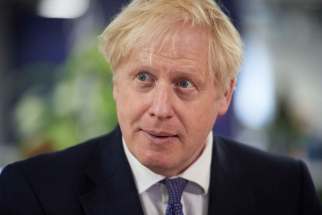Power broker NDP back in game under direction of former Manitoba cabinet minister
Read this article for free:
or
Already have an account? Log in here »
To continue reading, please subscribe:
Monthly Digital Subscription
$0 for the first 4 weeks*
- Enjoy unlimited reading on winnipegfreepress.com
- Read the E-Edition, our digital replica newspaper
- Access News Break, our award-winning app
- Play interactive puzzles
*No charge for 4 weeks then price increases to the regular rate of $19.00 plus GST every four weeks. Offer available to new and qualified returning subscribers only. Cancel any time.
Monthly Digital Subscription
$4.75/week*
- Enjoy unlimited reading on winnipegfreepress.com
- Read the E-Edition, our digital replica newspaper
- Access News Break, our award-winning app
- Play interactive puzzles
*Billed as $19 plus GST every four weeks. Cancel any time.
To continue reading, please subscribe:
Add Free Press access to your Brandon Sun subscription for only an additional
$1 for the first 4 weeks*
*Your next subscription payment will increase by $1.00 and you will be charged $16.99 plus GST for four weeks. After four weeks, your payment will increase to $23.99 plus GST every four weeks.
Read unlimited articles for free today:
or
Already have an account? Log in here »
Hey there, time traveller!
This article was published 06/10/2020 (1890 days ago), so information in it may no longer be current.
OTTAWA — While she steers the federal NDP as it props up the minority Trudeau government, former Manitoba cabinet minister Jennifer Howard says she isn’t worried about the Liberals stealing her party’s thunder.
“Our focus has been very much more on what we can accomplish for people and I think that does make us relevant to people’s lives,” said Howard, who has been chief of staff to NDP Leader Jagmeet Singh since leading his election campaign in 2019.
That campaign, funded in part by mortgaging the party’s headquarters in Ottawa, saw the NDP lose almost half its seats: to 24 from 39. The Bloc Quebecois came roaring back from obscurity, while the NDP’s dozen seats in Quebec were reduced to one, giving the New Democrats fourth-place status in the House of Commons.
But during the COVID-19 pandemic, the party appears to have climbed back to relevancy, which Howard says is partially due to her experience in the Doer and Selinger governments in Manitoba.
The Bloc has had minimal success in their calls for more non-COVID health-care funding, and better protections for the French language.
The Conservatives broke the Liberals’ surge in the polls by digging up dirt on the WE Charity scandal and the government’s relations with China. While that cornered the government into proroguing Parliament this summer, the Tories’ demands on reforming business supports, rolling out rapid testing and protecting oil-sector jobs haven’t had as many results.
During that time, the NDP has successfully pushed the Liberals to increase unemployment benefits and boost financial aid to disabled people.
The party took up the torch for two weeks of paid sick leave, which was spearheaded by premiers of various stripes, so that people waiting for a COVID-19 test don’t feel obligated to work.
“On many things we’ve heard no, and sick leave is a good example: ‘No, it’s not federal jurisdiction; how is that even possible? Why are you even asking for such a thing?’ And now we’ve got it,” Howard told the Free Press this week.
“What my experience in government brings is to not stop at the first ‘no’ you get from the federal government, but to keep fighting.”
Howard, who is part of the regular calls between the Prime Minister’s Office and opposition parties, said the NDP has made achievable policy changes a priority, ahead of scoring political points.
“Our focus through the pandemic has been fighting to get the government to use its power to help people,” she said. “That discipline is probably what has helped us achieve some of those things.”
In an interview last month, Singh told HuffPost Canada that he might prop up Trudeau’s minority for an entire four-year mandate, if he can extract enough concessions from it.
This could mean a repeat of the Pearson Liberals’ five years of minority government in the 1960s, in which they relied on NDP support in exchange for implementing signature programs such as pension indexing and universal health care.
The NDP’s strategy to cosy up to the Liberals has irritated politicians in the other parties. In May, Singh traded the sick-leave proposal for supporting the votes the Liberals needed to suspend Parliament until September, instead of allowing MPs to question the government four days a week in both the Commons and an online video platform.
The Tories and the Bloc said it was an undemocratic move that blocked them from being able to grill the government, particularly on a dysfunctional commercial rent-relief scheme and the closing down of the federal government’s pandemic alert system, the Global Public Health Intelligence Network.
At the time, Howard implied the other parties were all talk. “The point of the House of Commons, the point of Parliament, is to get things done for people,” she told the Globe and Mail in May.
This week, she said the Liberals’ decision to prorogue Parliament this fall suggests the government would have found another way to avoid accountability without the NDP deal. “They have shown they have no hesitation at going to the Governor General, and asking to escape that scrutiny,” she said.
Her party came to Trudeau’s rescue again last month. The NDP announced it would support the Liberals in a confidence vote, avoiding an election, if the government boosted unemployment benefits to match that of the Canada Emergency Response Benefit, which is being phased out.
The National Post summed it up with the front-page headline “PM buys NDP support.”
Opponents grumble the NDP is just buying time because it’s too broke to run an effective election campaign, though Howard claims fundraising puts them in a better position now than a year ago.
It’s unclear if Howard’s gambit to focus on results will help her party at the ballot box when the next election does occur.
The NDP’s policy victories, such as more generous benefits for Canadians, will likely only make the Liberals more attractive. They have received a boost in the polls since March, when the pandemic started. During the same time, Singh’s party has failed to crack the 20 per cent support mark.
Howard said the NDP will ask Canadians to focus on how her party has pushed the needle.
“What Canadians will see is that it’s a very good thing that they elected enough New Democrats to make a difference in Ottawa. Just think what could happen if there were more of us,” she said.






